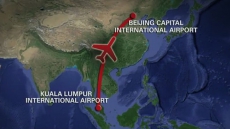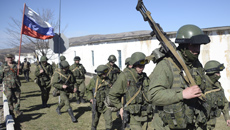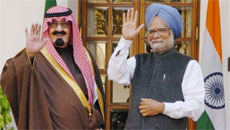When, in mid-1945, the allied armies advancing across Western Europe were ordered to halt to enable the marauding Soviet forces perform the final denouement of the Second World War by capturing Berlin, it sowed the seeds of the Cold War that lasted almost half-a-century and whose present-day ramifications are there for all to see.
It was a different thing that the Soviet Union had much to avenge for the Siege of Leningrad and the Battle of Moscow that the Wehrmacht had so brutally staged through much of the conflict, but it would be rather naïve to believe that this was the sole reason for asking the allies to halt.
The larger picture involved the military-industrial combine - the expression evolved in the coming years - that had been created in the Western world and the Soviet thanks to the conflict and which could not grind to a halt just because the War would soon end.
How was it to be kept going in the post-war era? Principally by the creation of the Iron Curtain and alliances like NATO and the Warsaw Pact - and lesser-lived entities like CENTO, SEATO and ANZUS.
There was no real threat of war as the former allies ranged against each other and the closest this happened was in 1962 after the disastrous Bay of Pigs invasion and the Cuban Missile Crisis, but these were quickly defused as none of the principal protagonists were really interested in anything beyond sabre-rattling - the Vietnam war being one exception.
At the same time, the dynamics of the military-industrial combine dictated that the two sides maintain what, in military terms, is quaintly referred to as a "high state of alert". Thus, both sides began to churn out newer and more lethal arms, aircraft, missiles, tanks, ships and other fighting vehicles - all of which had a shelf-life and had to be regularly replaced.
All this came to an abrupt end, first with the collapse of the Berlin Wall in 1989, followed two years later by the dissolution of the Soviet Union itself.
All of a sudden, from two superpowers, there was just one. The new Russia posed no threat as it attempted to do away with the legacy of the past and come to terms with the new republics in the Commonwealth of Independent States (CIS). Also, the military-industrial combine of the erstwhile Soviet Union was split among a plethora of new states that had more pressing political and economic issues to deal with at the time.
The Western alliance, however, couldn't afford the luxury of sitting back. A trailer of sorts was provided by the First Gulf War (August 1990-February 1991) when Confucius was stood on his head and a cannon was used against a mosquito. It was widely believed that the Soviet Union was supplying Scud missiles and other lethal weapons to Iraq but there was no real danger of intervention as Moscow was still coming to terms with the collapse of the Berlin Wall and staring in its face the disintegration of the USSR itself.
Then, there was the Second Gulf War (March 2003-December 2011) but the defining moment, as it were, came in the wake of the September 11, 2001, bombing of New York's Twin Towers.
Less than a month later, albeit under UN sanction, U.S. and British forces had stormed into Afghanistan to oust the Taliban, which had refused to extradite Al Qaeda leader Osama bin Laden, who Washington blamed for masterminding 9/11. The circle was complete in 2003, with NATO assuming command of the International Security Assistance Force (ISAF) that the UN Security Council had created in December 2001 to oversee the Afghan operations.
Thus, we have a situation in which NATO, created principally to take on the Warsaw Pact and to operate in Europe, has found itself in far-away Afghanistan. It's a different thing that many member-countries of the erstwhile Warsaw Pact are now part of NATO, but having tortuously got to where it is today, is the Alliance likely to leave in a hurry?
For much of this decade, there has been considerable talk of a pull-out, but pause for a moment to consider that what is being spoken about is not a withdrawal but a "drawdown", much as, not too long ago, even warships battened down to ride out storms.
Consider this: It is widely believed that Kandahar in the south would fall to the Taliban operating out of Pakistan's frontier areas if the ISAF were to pull out. Then, the Northern Alliance and the Uzbeks are straining at the leash, dearly hoping for a withdrawal
What also can't be ignored are groups like the Taliban, Al Qaeda, the Haqqani Network, the Hezb-e-Islami Gulbuddin, the Lashkar-e-Jhangvi and smaller ragtag outfits all waiting to extract their pound of flesh.

And finally, there is Kabul, virtually Afghanistan's Jewel in the Crown. Can it be defended in the absence of the ISAF? The jury's definitely out on that one.
There's also the question of what happens to the 100,000-odd troops that make up the ISAF and the equipment valued at some $7 billion it holds.
Someone suggested that part of it could be given to Pakistan to aid in Islamabad's war against terror. But does anyone seriously think Pakistan will just sit quiet if there is a pullout?
A few weeks ago, in the wake of the crisis in the Crimea, there was a suggestion that it could revive Cold War tensions. But that seemed so far-fetched that it quickly died a natural death.
Thus, in all probability, what will happen is the ISAF will batten itself down in cities like Kabul, Kandahar, Herat, Jalalabad and Mazar-e-Sharif and other critical areas to ensure that the Taliban, which was eliminated with such difficulty, does not creep in again.
After all, the military-industrial combine has to be kept going, even if it is for a back-door occupation!






